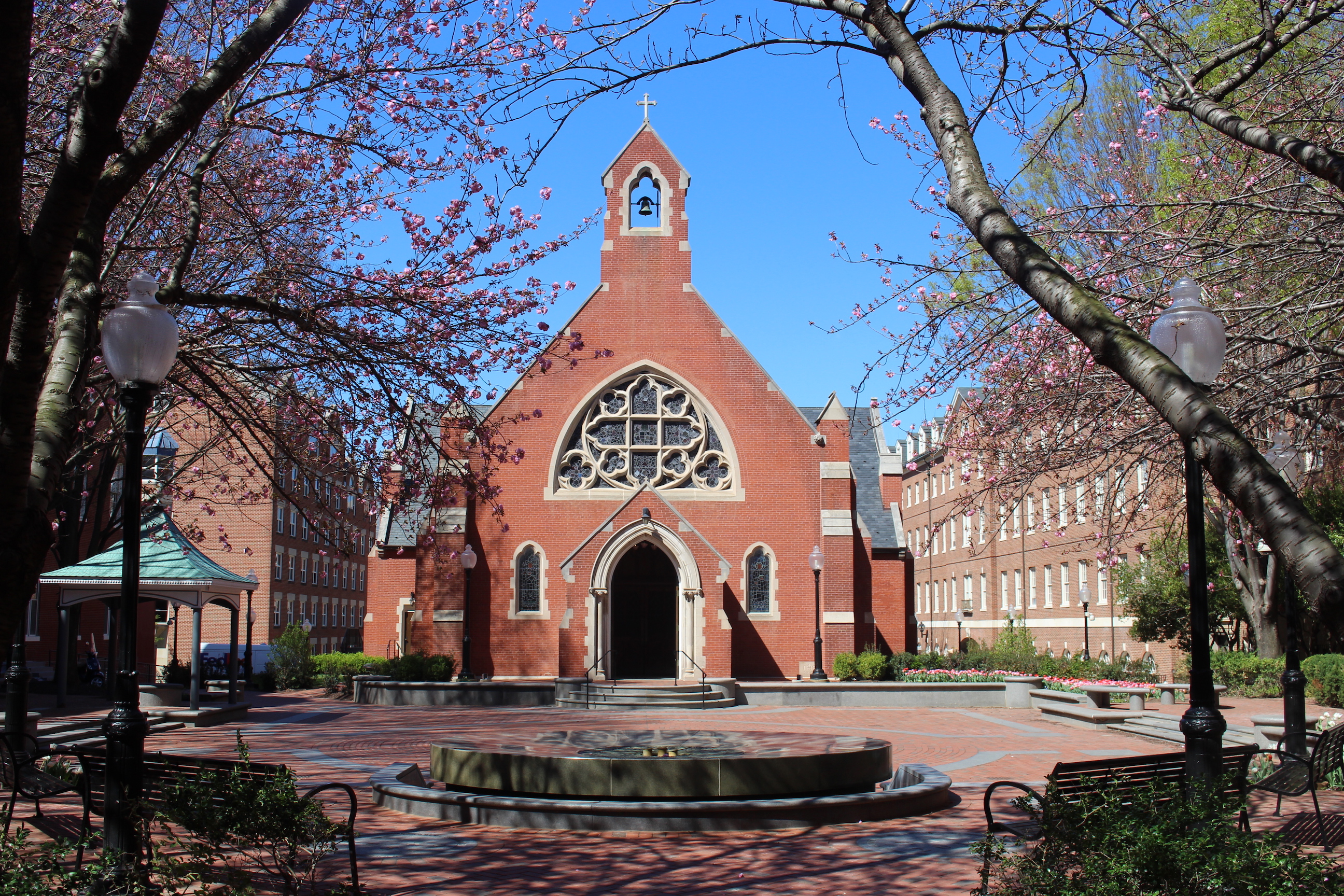The usual clamor that accompanied a Sunday on the Hilltop was gone. Georgetown was uncannily quiet after the university announced its transition to virtual classes. Yet, those still on-campus were greeted with a calming and familiar tune. Organ music echoed from Dahlgren chapel as regular Sunday mass continued without a physical congregation on March 15. While 50 people streamed the mass in real time, within a week the recorded service had been viewed over 16,000 times.
Georgetown’s live-streamed mass attracted far more attendees than a regular service and comes at a time of extreme anxiety regarding the spread of COVID-19 in the U.S., as the count of confirmed U.S. cases surpasses 800,000. With shelter-in-place guidelines in place across the country, Americans are unable to cope with stress in normal ways, such as being with friends or spending time in public. Many members of the Georgetown community and beyond are turning to faith and virtual religious services to find peace.
Emma Bradley (SFS ’22) has been attending virtual religious services as a source of hope, even as her life on campus has been uprooted. “For me, faith has definitely been the central, the only place that I really have been able to find peace in the midst of so much uncertainty. But uncertainty provides an opportunity for one of two responses: fear or hope,” Bradley said.
“When the rest of our lives are put on hold, it is an invitation to go deeper in faith because we don’t know what’s going to happen and we don’t know what’s next,” she said.
Students of any religion or denomination can find a worship service to join. While Protestant Ministry has weekly worship and bible study, Orthodox ministry has office hours, Jewish Life is holding weekly Shabbat, and Dharmic ministry is offering weekly devotionals as well as guided meditations. Despite faith services going virtual, attendance has not suffered.
“The most surprising part of this shift is how much appreciation there is for it. I think I was surprised to see so many people in the tiny Zoom camera views, and it was heartening to see them again the following week, or before that in the case of the discussion groups and one-to-one sessions,” Director for Dharmic Life and Hindu Spiritual Advisor Brahmachari Vrajvihari Sharan said.
While attending a virtual religious service is not the same as an in-person congregation, Bradley finds joy in connecting with others digitally during self-isolation. “I think it’s also really beautiful that it is happening in community, just coming together with friends and family and peers virtually,” Bradley said.
Despite the suspension of in-person religious services, Georgetown’s Campus Ministry is offering opportunities for students to take this time to learn more about their faith. Imam Yahya Hendi, the Director of Muslim Life, is holding weekly services as well as Qur’an studies. “Faith has encouraged students to rethink faith not only in belief in God or reconnecting with a higher power, but faith in action,” he said.
Across the country, non-profit organizations are closing or attempting to continue reduced services without volunteers. While students may be unable to serve in-person, Imam Hendi urged the Georgetown community to use faith as an opportunity to reflect on social justice.
“Faith has encouraged students to rethink faith not only in belief in God or reconnecting with a higher power, but faith in action,” he said.
“We find ways to divide for so many reasons, can this be the reason to find ways to unite?”
Students can find these opportunities through Georgetown programs. While the CSJ has suspended many of its in-person programs, some team members are still serving the D.C. area.
According to CSJ Executive Director Andria Wisler and Deputy Director Ray Shiu, the CSJ is distributing groceries from the Father McKenna Center’s food pantry to immigrant communities within D.C. The CSJ is also collecting and distributing school supplies to families in need of homeschooling materials.
Wisler and Shiu emphasized the importance of social justice efforts during the Covid-19 pandemic. “There remains deep needs during this pandemic, as many vulnerable communities in Washington, DC and beyond have not been equitably supported,” Wisler wrote.
“The federal stimulus package omitted undocumented individuals and families,” she added.
The CSJ is also encouraging students to volunteer virtually. The CSJ’s EngageDCorps program is continuing online, with Georgetown students virtually tutoring youth they worked with earlier in the semester. Summer volunteer opportunities will also proceed remotely, including the After School Kids program, the Summer Advocacy Program, and Summer Online Mentorship and Education program.
Outside of Georgetown programs, the CSJ is providing an updated list of external virtual volunteer opportunities. The United Nations, Amnesty International, and Translators Without Borders are looking for translators to help non-english speakers informed regarding Covid-19. Educational services are asking for tutors for elementary students as well as help scanning books online.
Despite the pandemic, Fr. Christian Wagner S.J., a member of the Georgetown Jesuit community, encourages students to continue combating social inequalities. “There are still possibilities to work on social justice, enhance it, and improve it,”
“We are finding new creativity and new ways to connect with people from our homes. There are still other ways we can help people really struggling. We can reach out to people virtually, or even financially, as for many people even buying food is a real challenge,” he added.
Fr. Wagner lives on-campus in the Jesuit residence, which is observing strict social distancing policies to protect older and immunocompromised members of the community. While the Jesuits can no longer all congregate together, they are still celebrating masses in a limited manner with minimal social interaction.
While Fr. Wagner is grateful he can continue to worship in mass, he emphasized the social fellowship that makes religious services more meaningful. “People have much longing for this community, which shows mass is not just a show played on a screen. Mass is something more than saying the prayers, there is a communal celebration that is missing,” he added.
Despite the drawbacks of being isolated from a religious community, Wagner pointed out that solitude can still offer an opportunity for people to grow in their faith individually. “I think everyone is touched by God, and now people realize this invitation is a crucial part of who they are. People are rediscovering the root of faith in their lives.”
Although Georgetown religious services are following social distancing guidelines, some religious leaders across the country have been criticized for continuing in-person services and disregarding the science behind the coronavirus. Lahy Amman (COL ’20), who identifies as a non-religious student, pointed out that while faith can be an antidote to people’s anxieties, religion does not offer all the answers to the COVID-19 crisis.
“It’s natural for people to turn to what gives them strength and security in life,” Amman said.“But if turning to religion means unquestioning obedience to, say, a religious leader that advises people not to follow advice from doctors and other experts, that’s a problem.”
While Bradley finds hope in her religion, she does not think that religious groups should underestimate the seriousness of the coronavirus. “I think faith and reason always go hand and hand. So faith communities and faith leaders taking precautions is important, as well as respecting science and facts, and acknowledging the real suffering and pain behind this,” Bradley said.
Although Georgetown’s Campus Ministry leaders are working to help students grow their faith from afar, virtual services are admittedly limited in their ability to articulate religious teachings. Brahmachari Sharan looks forward to a day when the pandemic subsides and regular rhythms of campus life resume.
“Although I am glad that the online platforms exist and we can continue our work with students digitally, I look forward to the day when we can all say Namaste to each other in person on the Hilltop again—and hasten to wash our hands.”





